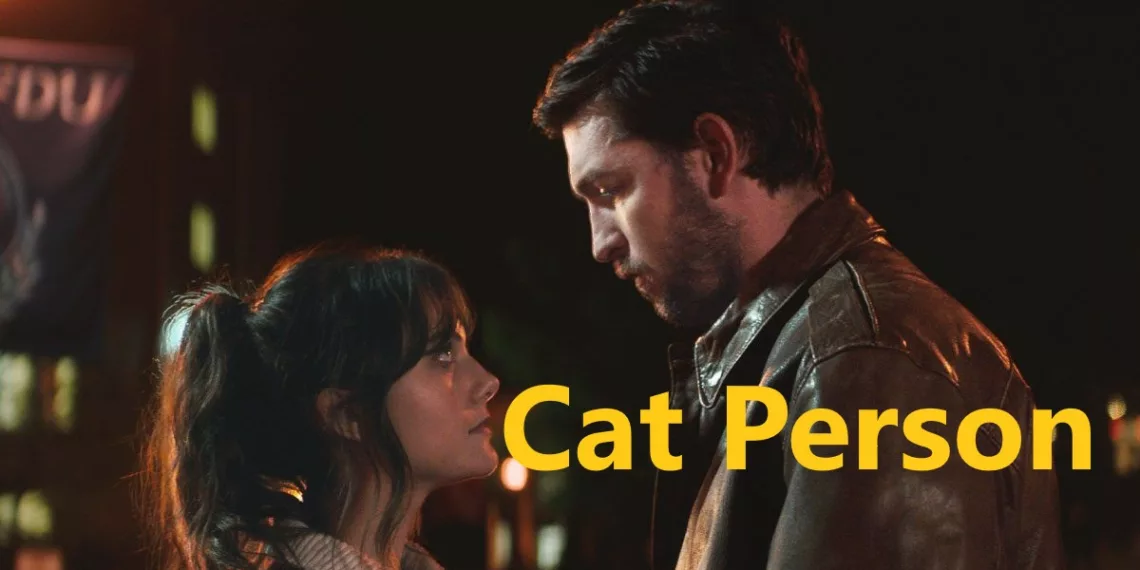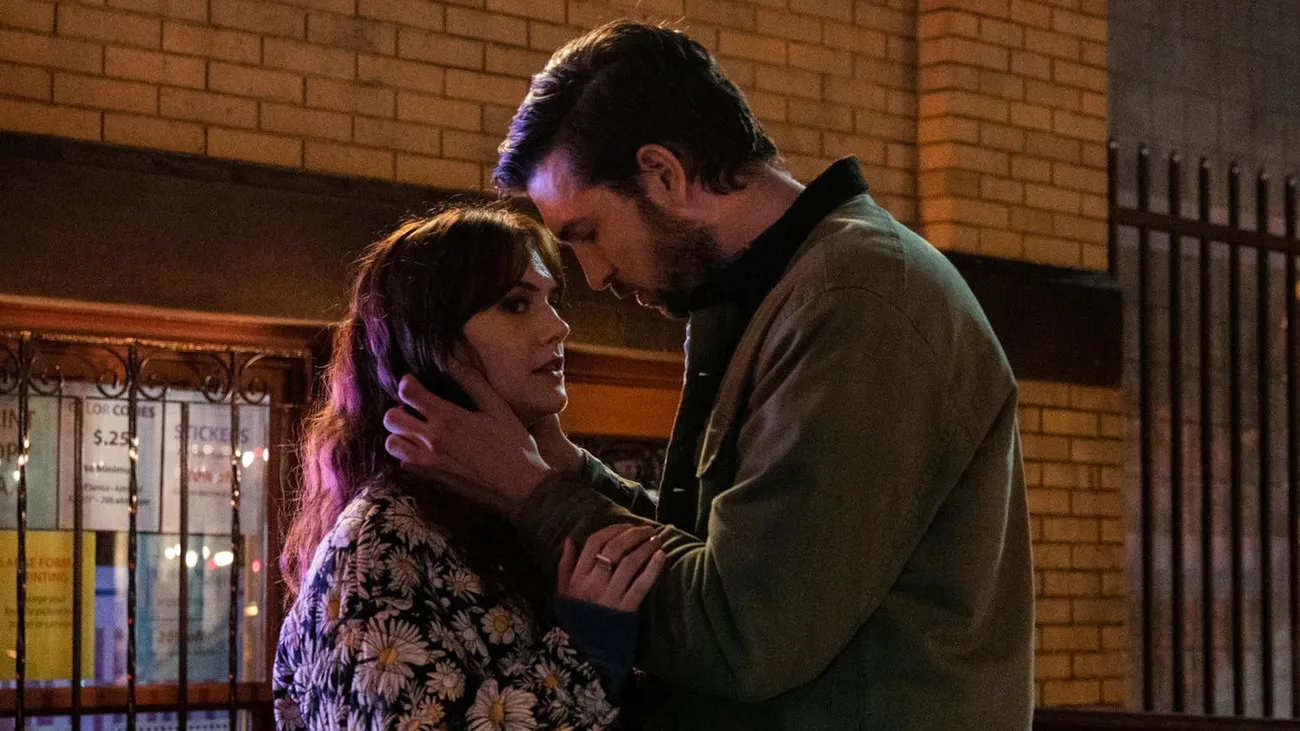You may have first encountered the story of Margot and Robert in a buzzy 2017 New Yorker short story. Kristen Roupenian’s “Cat Person” instantly went viral, sparking heated conversations about modern dating, power dynamics between men and women, and the nature of consent. Now, this zeitgeist-capturing tale makes its way to the big screen in an equally timely film adaptation.
Dropping just as the #MeToo movement continues rippling through Hollywood and beyond, Cat Person translates Roupenian’s provocative ideas about gender and intimacy to celluloid. Tapping into the vulnerabilities and confused signals that so often surround new relationships, it tells the cringe-inducing yet relatable story of a college student, Margot, getting entangled with Robert, an older man she meets at her theater concession job. Their flirty text exchanges eventually give way to an excruciating IRL date and even more awkward sexual encounter…one Margot comes to regret.
As this Rashomon-style exploration of one fraught courtship unfolds, prepare to wrestle with thorny questions about victimhood, accountability, mixed messages and consent in the post-Weinstein era. Love it or hate it, Cat Person is sure to spark heated water cooler chat.
When Flirty Texts Lead to Cringey Hookups
Our protag Margot is a 20-year-old anthropology student who slings popcorn at a quirky repertory theater playing retro hits like The Empire Strikes Back. There she meets Robert, a lanky regular nearly old enough to be her dad (though she thinks he’s 25 at first). When this Nicolas Cage lookalike clumsily asks Margot for her digits one night, she unexpectedly says yes.
Thus begins a playful text flirtation between the odd couple, all witty banter and coy references to Robert’s alleged pet cats. But when he shows up unannounced at Margot’s dorm with late-night snacks, red flags start popping like kernel seeds in the microwave. Robert seems harmless enough…yet something about him rubs Margot the wrong way.
Still, intrigued by her newfound power to make an older fella fawn, she agrees to an actual date. Robert takes her to see—what else?—Star Wars, then back to his place. Turns out he has no cats after all, just a pitiful lack of decor and some cringe-worthy moves in the bedroom. During an agonizing sexual encounter, Margot mentally checks out, waiting for it to end. Afterwards, she ghosts him hard.
Spurned, Robert unleashes a torrent of furious texts, even calling Margot a whore. She blocks his number, but can’t shake the nagging feeling this awkward episode will come back to haunt her. And oh boy, does it ever…
Roupenian’s zeitgeist-y short story concludes there. But the movie has extra nightmare fuel in store as Margot’s worst fears about scorned man Robert come barreling into reality. Buckle up, folks.
Power, Perspective and America’s New Sexual Culture Clash
More than just an awkward tale of texts-turned-to-sex, Cat Person captivates as it holds up a Black Mirror to society’s muddy new rules around courtship and consent. Who truly has the upper hand in the lead pair’s May-December fling? Is it Margot, an alluring ingénue hyped up on her blossoming sexual power? Or Robert, a decade older yet hopelessly outpunched, dying for any female approval he can get?
The film playfully ping-pongs between their dueling experiences. When Robert pulls a Lloyd-Dobler-esque move and turns up unannounced, he sees it as charmingly retro. Yet to Margot, it screams “stalker.” As far as she’s concerned, Robert could be anything from mildly deceitful to a psychotic murderer. Funny fantasy sequences visualize her worst fears. But are they exaggerated…or right on the money?
Through this gender lens, Cat Person hints at a profound gap emerging between old-school manhood and Gen Z womanhood. Robert belongs to an analog era, weaned on Harrison Ford flicks and raised to pursue romance via grand gestures. Meanwhile, Margot epitomizes the digital generation—sexting racy pics one minute, slamming men online alongside her sardonic roomie the next.
As an intimate encounter pushes their disconnect into cringey focus, we witness the fallout when outdated male expectations smash into 2020s female empowerment culture. In its ugliest form, this clash turns sexual, exposing some men’s deeply rooted Madonna-whore complexes. Yet Cat Person refuses simple heroes and villains, instead steeping us in ambiguities with no clear rights or wrongs.
Who should we sympathize with more here? The naive young woman underestimating her feminine wiles? Or the insecure older dude clinging to antiquated codes of manly conduct? However you see it, this zeitgeisty psychodrama surely marks a relationship Rubicon for the post-Weinstein era.
Critics Clash Over Power Dynamics and Payoff
Cat Person enjoyed a mostly warm reception at Sundance, with reviewers praising its timely exploration of gender roles and sexual politics. Leads Emilia Jones and Nicholas Braun also earned kudos for their committed performances as mismatched lovers struggling to connect across a generational divide.
However, critical opinion diverged around the film’s over-the-top final act. Some cheered the gonzo horror flick swerve as a boldly provocative way to literalize Margot’s worst fears about scorned man Robert. Yet detractors argued the descent into slasher territory short-circuited the story’s initial nuance, replacing complicated human dynamics with shallow genre thrills.
Indeed, Cat Personhit Sundance ready for controversy, arriving in the midst of full-blown culture wars around issues of consent and gender power. Perhaps inevitably, reactions tended to mirror preexisting biases, with some viewers reading Robert as pure predator and others seeing Margot as a castrating femme fatale.
Yet the screenplay generally resists tidy conclusions about blame and accountability. Who holds more responsibility for the central duo’s disastrous sexual encounter remains an open question, with evidence damning both parties. Some critics lauded this even-handedness for honoring each viewpoint. Just as many blasted Cat Person’s avoidance of clear moral stands, either pro-woman or pro-man.
Five years post-#MeToo, a story devoted to dissecting “gray area” intimacy was bound to court division. Sure enough, fiery film-fest debates revealed how deeply questions raised by Cat Personcontinue to polarize. But if hitting raw nerves was the goal, mission accomplished. This hot-button psychodrama gives the culture permission to finally have some uncomfortable yet overdue conversations.
Even among dissenters, most agree this flawed Sundance standout earns points simply for boldness. Those not triggered by slippery power dynamics may discover a fresh cinematic angle on consent. But approach at your own risk—Cat Person plays utterly without filters.
Spotty Execution Can’t Sink Daring Performances
Whatever its flaws, Cat Person deserves credit for mostly dodging the pitfalls of adapting a viral short story. While the mish-mashed tone doesn’t always work, several technical elements showcase plenty of upside.
Chief among them are the dynamically opposed lead turns by Emilia Jones and Nicholas Braun. Jones expertly communicates Margot’s mix of naïve arrogance and confused vulnerability, selling her worst-case scenarios with an air of overthought ridiculousness. Meanwhile, Braun cleverly strips away all traces of Cousin Greg’s swagger, leaning into Robert’s endearing awkwardness.
When this mismatched pair shares the screen, cringe-comic magic ensues—never more so than during their squirm-worthy Star Wars date. Cat Person springs to creative life exploring the gap between our real and online personas. Early text message exchanges shine thanks to sharp dialogue and nifty visual tricks.
If only the shakier plotting lived up to those interpersonal fireworks. Overstuffed with devices like fantasy asides and genre bait-and-switches, Cat Person loses narrative traction as Margot and Robert’s IRL crisis darkens. Torn between black comedy, psycho-thriller and topical drama, the story raises big questions without sticking its ending.
Still, flaws and all, the sheer nerve on display deserves applause. Where else will you find such an unforgivingly frank reflection of dating dynamics in the post-#MeToo age? Uneven execution can’t sink a voyage this daring.
Imperfect Yet Essential Viewing
For all its uneven moments, Cat Person ultimately makes its mark through brazenness alone. This twisted Gen-Z rom-com meets slasher flick refuses to soften its dark message just to satisfy expectations. Tonally messy? Thematically overwrought? Perhaps. But also daringly, brutally honest about the landmines lurking within modern courtship.
Bolstered by Emilia Jones and Nicholas Braun’s note-perfect character studies, Cat Person overcomes patchy plotting to cast relationships in a revealing post-#MeToo light. Their push-pull chemistry both seduces and unsettles, crystallizing the story’s insight into desire’s risky, unmapped frontiers.
By swinging for the fences in its gonzo final act, the film knowingly courts controversy to match its source material’s viral impact. Cat Person won’t be for everyone, especially those made uncomfortable by slippery questions of consent and accountability. Yet no movie lover can dismiss its sheer envelope-pushing ambition.
In the end, flaws pale beside the film’s timely resonance. We may live in strange new sexual times, where battle lines around empowerment and victimhood blur daily. For capturing these cultural growing pains in such a conversation-starting package, Cat Person deserves a cautious recommendation. Watch it to engage the moment’s issues, not airbrushed art.
The Review
Cat Person
Messy, unpredictable and guaranteed to polarize, Cat Person mirrors the cultural muddle it examines. This zeitgeist-surfing hot take on toxic sexual power dynamics captures our collective confusion around modern dating with cringe-worthy precision. Uneven storytelling and drastic tonal shifts prevent the film from fully resonating. Yet brave performances and just enough gonzo inspiration earn Cat Person a cautious thumbs up for sheer conviction alone. In the end, Roupenian’s cautionary psychodrama makes for an imperfect yet essential document of the post-Weinstein era. Watch it more as a conversation starter than a smoothly crafted art piece. Because only by wading into ambiguity can we hope to understand each other better.
PROS
- Strong lead performances from Emilia Jones and Nicholas Braun
- Timely, conversation-starting themes related to consent and gender dynamics
- Clever visualizations of Margot's anxieties through fantasy/horror interludes
- Sharp dialogue, especially in early texting exchanges
CONS
- Uneven tonal mix of awkward comedy, psychological thriller, and drama
- Overstuffed plot relies too heavily on devices and genre bait-and-switches
- Rushed, over-the-top final act short-circuits nuance
- Avoidance of clear moral stands on issues of blame/accountability


















































